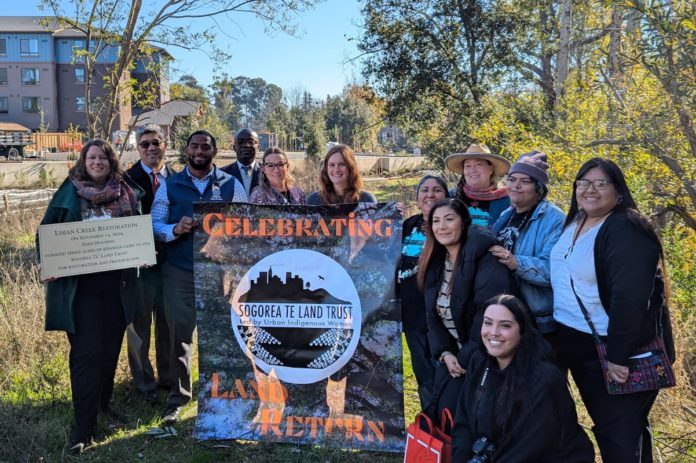In the fall of 2023, a Castro Valley neighborhood bid farewell to most of Ruby Meadow, a patch of nature left untouched when the Caltrans Foothill Freeway project was canceled. Most of the space was purchased by Eden Housing and repurposed for affordable housing, amid resident concerns about pollution of San Lorenzo Creek, displacement of wildlife and felling of old growth trees.
One point of contention was that Eden Housing did not conduct an Environmental Impact Report (EIR) and evaluate alternate sites, which might have forced them to move the planned development to a different area. Sidewalks and a bus stop within half a mile were requirements for the Bond Measure A1 funding used to build the development. (Sidewalks have been added.) No tenants have moved in yet, but when they do limited street parking may also become an issue.
A year later, residents are finding a bright spot in the giving of three acres of land to Indigenous group Sogorea Te’ Land Trust. This portion of Ruby Meadow was a Caltrans conservation easement for environmental damage done elsewhere. According to Sogorea Te’s website, the site will be maintained and managed under a conservation easement funded by a perpetual endowment from Caltrans. The title was transferred to Sogorea Te’.
Earlier in 2024, the same Native group was able to purchase a site in Berkeley that’s currently a parking lot, but historically was a massive shell mound. In that case the group paid $25.5 million dollars to acquire the paved over land. And building a planned park and cultural center will cost more. The three-block area could have been developed into housing and retail, which highlights an interesting parallel between Berkeley and Castro Valley: Housing and environmental advocacy tend to get pitted against each other when most care about both.
Ann Maris, board director of Friends of San Lorenzo Creek, remembers the Caltrans Class Action lawsuit of the ‘70s. The same failed freeway project that left Ruby Meadow untouched was set to displace low-income tenants living along the proposed route until a lawsuit blocked the project.
“Castro Valley is officially an environmental justice priority population that needs help. That means residents are impacted more by pollution than the average Californian,” Maris said. She also pointed out that the site did not pass inspection as a conservation easement, and Caltrans will need to do two additional years of restoration. However, to Maris, a Native group knowledgeable with local flora and fauna is a good choice to take charge of the habitat restoration.
Still, trees and bushes on either side of the creek have been removed, even in the conservation area. Where before residents couldn’t see across the creek, now the new housing on the opposite side is plainly visible. Western Red Bats living in the trees have likely been displaced. Eden Housing did leave felled trees in place for a day or so to allow animals to migrate away from the meadow. Maris is encouraging pro-deer neighbors to grow plants deer like.
Even with this loss, the transfer of the land is a win in several ways. It’s the first waterway that has been given back to the Ohlone people and the first land given back in Hayward or in unincorporated Alameda County. This move could encourage further land back moves in Hayward to Sogorea Te’ or similar groups. Maris mentions 10 empty acres near her house designated not for housing. There are more sites that can benefit from Native stewardship.
“Most everyone I’ve talked to is really happy that this historic event has happened in our neighborhood in the middle of such a sad loss,” said Maris. “It doesn’t take away the loss, but it gives us some hope for the future.”
Caltrans Class Action lawsuit: www.hayward-ca.gov/your-government/departments/city-managers-office/238




